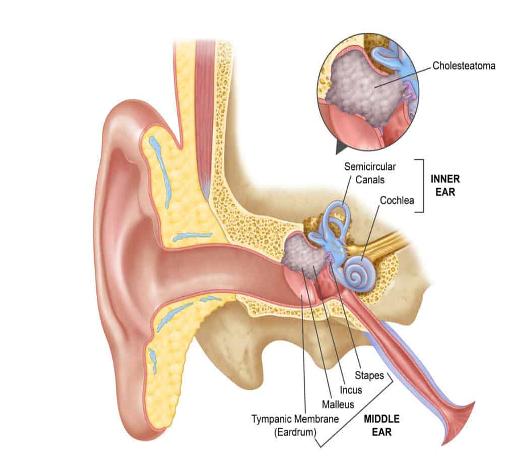Mastoidectomy
Overview
At Indotaj Medical Center, Mastoidectomy, a surgical intervention involving the removal of part or the entirety of the mastoid bone situated behind the ear, is skillfully performed to address chronic ear infections, cholesteatoma, and other mastoid air cell-related conditions. Our otolaryngologists employ a range of techniques, including open or endoscopic approaches, tailored to each case, aiming to eradicate infection, enhance hearing, and prevent complications. Post-operative care at our center includes vigilant monitoring for potential complications and ensuring optimal healing of the surgical site.

Why it's done
Mastoidectomy is performed for several reasons, primarily to address specific medical conditions affecting the ear and mastoid region. Common reasons for undergoing mastoidectomy include:
- Chronic Ear Infections: Mastoidectomy is often carried out to treat persistent or recurrent ear infections that have not responded to other forms of medical treatment. By removing infected tissue and improving drainage, the procedure helps eliminate the source of infection.
- This surgical intervention is crucial in the management of cholesteatoma, an abnormal skin growth in the middle ear. Mastoidectomy is performed to remove the cholesteatoma and prevent its complications, such as erosion of surrounding structures.
- Mastoid Air Cell Disorders: Conditions affecting the mastoid air cells, such as mastoiditis (inflammation of these air cells), may necessitate mastoidectomy. The surgery helps alleviate inflammation, prevent the spread of infection, and restore normal function.
- Complications Prevention: Mastoidectomy is undertaken to prevent complications associated with untreated ear conditions, including the potential spread of infection to critical structures like the brain. Timely intervention through mastoidectomy can mitigate these risks.
- Hearing Improvement: In cases where hearing loss is linked to mastoid-related issues, mastoidectomy can contribute to the restoration or improvement of hearing by addressing the underlying problems affecting the ear.
Risk
Mastoidectomy carries inherent risks and potential complications. Some of the risks associated with Mastoidectomy include:
- Infection
- Hearing Loss
- Balance Issues
- Facial Nerve Injury
- Taste Disturbance
- Meningitis
- Anesthesia Risks
- Scarring
- Recurrence of Conditions
How do I get ready for mastoidectomy surgery?
Preparing for a Mastoidectomy surgery involves several steps to ensure a smooth and successful procedure. Here are general guidelines, but it’s crucial to follow the specific instructions provided by your healthcare team:
Consultation and Education:
- Schedule a detailed consultation with your surgeon to discuss the procedure, potential risks, and expected outcomes.
- Ask any questions you may have and ensure you fully understand the surgery and the post-operative care.
Medical Evaluation:
- Complete any pre-operative tests or evaluations recommended by your surgeon. This may include blood tests, imaging studies, or other diagnostic procedures.
Medication Review:
- Provide your surgeon with a list of all medications, supplements, and herbal remedies you are currently taking.
- Follow your surgeon’s instructions regarding the use of medications before the surgery, including any adjustments to your regular medication schedule.
Pre-operative Instructions:
- Follow any pre-operative instructions provided by your surgeon, such as fasting guidelines before surgery.
- If you smoke, consider quitting or at least reducing smoking before the surgery, as smoking can affect healing.
Arrange Transportation:
- Plan for transportation to and from the hospital or surgical center on the day of the surgery. You will likely be unable to drive immediately after the procedure due to the effects of anesthesia.
Post-operative Support:
- Arrange for someone to assist you at home during the initial recovery period.
- Ensure your home is set up with necessary supplies, including any recommended pain medications, dressings, or medical equipment.
Clothing and Personal Items:
- Wear comfortable and loose-fitting clothing on the day of surgery.
- Remove any jewelry, piercings, or accessories before the surgery.
Hygiene:
- Follow any guidelines provided by your surgeon regarding pre-operative hygiene, such as showering with a special antibacterial soap.
Notify Your Surgeon:
- Inform your surgeon of any changes in your health, such as the development of a cold or infection, leading up to the surgery.
Follow Fasting Guidelines:
- Adhere to the fasting guidelines provided by your surgeon, typically requiring you to avoid food and drink for a specified period before the surgery.


